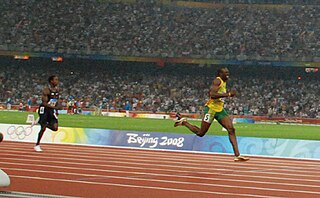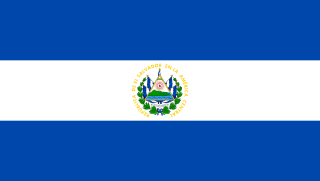
The men's 200 metres at the 2004 Summer Olympics as part of the athletics program was held at the Athens Olympic Stadium from August 24 to 26. There were 54 competitors from 41 nations. The event was won by 0.22 seconds by Shawn Crawford of the United States, the nation's 17th victory in the men's 200 metres after missing the podium entirely four years prior. His teammates Bernard Williams (silver) and Justin Gatlin (bronze) completed the sixth American sweep in the event and first since 1984.

France competed at the 2004 Summer Olympics in Athens, Greece, from 13 to 29 August 2004. French athletes have competed in every Summer Olympic Games of the modern era. The French Olympic Committee sent a total of 308 athletes to the Games, 195 men and 113 women, to compete in 25 sports.

Italy competed at the 2004 Summer Olympics in Athens, Greece, from the 13th to the 29th of August 2004. The country has competed at every Summer Olympic games in the modern era, except for the 1904 Summer Olympics in St. Louis. The Italian National Olympic Committee sent the nation's largest ever delegation in history to the Games. A total of 364 athletes, 229 men and 135 women, competed in 27 sports.

Germany competed at the 2004 Summer Olympics in Athens, Greece, from 13 to 29 August 2004. This was the nation's fourth consecutive appearance at the Summer Olympics after its reunification in 1990. The German Olympic Sports Confederation sent the nation's second largest delegation to the Games since its reunification. A total of 441 athletes, 250 men and 191 women, competed in 27 sports, and were nominated by DOSB at four occasions.
The men's 100 metres at the 2000 Summer Olympics as part of the athletics program were held at the Stadium Australia from 22 to 23 September. Ninety-seven athletes from 71 nations competed. Each nation was limited to 3 athletes per rules in force since the 1930 Olympic Congress. The event was won by American Maurice Greene, the United States's first title in the event since 1988 and 15th overall. Ato Boldon of Trinidad and Tobago improved on his 1996 bronze with a silver in Sydney. Obadele Thompson won the first-ever medal in the men's 100 metres for Barbados with bronze.

The men's 100 metres sprint event at the 1928 Summer Olympics in Amsterdam, Netherlands, were held at the Olympic Stadium on Sunday, 29 July and Monday, 30 July. Eighty-one runners entered, though ultimately seventy-six runners from 32 nations competed. NOCs were limited to 4 competitors each. The event was won by Percy Williams of Canada, taking the nation's first men's 100 metres gold medal. Jack London of Great Britain took silver, marking the third consecutive Games that Great Britain had a medalist in the event. Georg Lammers won bronze, Germany's first medal in the event since 1896. For the first time in modern Olympic history, the United States won no medals in the event.

The men's 200 metres at the 2008 Summer Olympics took place on 18–20 August at the Beijing National Stadium. There were 63 competitors from 53 nations. Jamaican Usain Bolt set a new world record of 19.30 seconds in the final, and won by the largest margin of victory in an Olympic 200 metres final. It was Jamaica's first victory in the event since 1976 and second overall, matching Canada and Italy for second-most. The apparent silver and bronze medalists, Churandy Martina of the Netherlands Antilles and Wallace Spearmon of the United States, were both disqualified. Those medals went to Americans Shawn Crawford and Walter Dix, who had been fourth and fifth across the finish line; Crawford gave his silver medal to Martina afterward. Crawford was the 10th man to win two medals in the 200 metres, and the third for whom those medals were gold and silver; nobody had yet won two gold medals.
The men's 100 metres event was part of the track and field athletics programme at the 1924 Summer Olympics. This race was depicted in the film Chariots of Fire. The first two rounds were held on 6 July, with the semifinals and final on 7 July. Eighty-six sprinters from 34 countries competed. The event was won by Harold Abrahams of Great Britain—Great Britain's first Olympic gold medal in the men's 100 metres and only the second time that the United States failed to win. Jackson Scholz kept the Americans on the podium with a silver. Arthur Porritt won the bronze, New Zealand's first medal in the event.

The men's 200 metres event was part of the track and field athletics programme at the 1924 Summer Olympics. The first two rounds were held on 8 July, with the semifinals and final on 9 July. Sixty-five sprinters from 33 countries competed. Nations were limited to 4 athletes each. The event was won by 0.1 seconds by Jackson Scholz of the United States, the nation's third consecutive victory in the event and fifth in six Games. For the third straight Games, the podium consisted of two Americans winning gold and silver and a Briton taking bronze. Paddock, the silver medalist in 1920 as well, was the second man to earn multiple medals in the 200 metres.
The men's 400 metres event was part of the track and field athletics programme at the 1924 Summer Olympics. This race was depicted in the film Chariots of Fire. The competition was held on Thursday, July 10, 1924, and on Friday, July 11, 1924.

The men's 200 metres was held on 2 September and 3 September as part of the athletics at the 1960 Summer Olympics, which were held in Rome. 74 athletes from 54 nations entered, but only 62 athletes from 47 nations ultimately competed. The maximum number of athletes per nation had been set at 3 since the 1930 Olympic Congress. The event was won by 0.1 seconds by Livio Berruti of Italy, the first victory in the event by a nation outside of North America and snapping a five-Games winning streak by the United States. The Americans finished with a silver medal, by Lester Carney, to extend their medal streak to six Games. Abdoulaye Seye of France took bronze. Berruti's gold and Seye's bronze were the first medal for their nations in the men's 200 metres.

The men's 400 metres hurdles event at the 1952 Summer Olympics took place July 20–21, 1952 at the Helsinki Olympic Stadium. There were 40 competitors from 24 nations. The maximum number of athletes per nation had been set at 3 since the 1930 Olympic Congress. The final was won by American Charles Moore. It was the nation's third consecutive and eighth overall victory in the event. The Soviet Union, in its debut, and New Zealand each earned their first medal in the men's 400 metres hurdles, with Yuriy Lituyev's silver and John Holland's bronze, respectively.
The women's 1500 metre at the 2011 World Short Track Speed Skating Championships took place 11 March at the Sheffield Arena.
The men's 500 metre at the 2011 World Short Track Speed Skating Championships took place 12 March at the Sheffield Arena.
The men's 1000 metre at the 2011 World Short Track Speed Skating Championships took place 13 March at the Sheffield Arena.
The women's 500 metre at the 2011 World Short Track Speed Skating Championships took place 12 March at the Sheffield Arena.

El Salvador competed at the 2012 Summer Olympics in London, United Kingdom, from 27 July to 12 August 2012. This was the nation's tenth appearance at the Olympics.
The men's 500 metre at the 2012 World Short Track Speed Skating Championships took place on 10 March 2012, at the Shanghai Oriental Sports Center.

The United States of America (USA) competed at the 2004 Summer Olympics in Athens, Greece. 533 competitors, 279 men and 254 women, took part in 254 events in 31 sports.
The men's kayak cross event at the 2023 ICF Canoe Slalom World Championships took place on 24 September 2023 at the Lee Valley White Water Centre in London.











